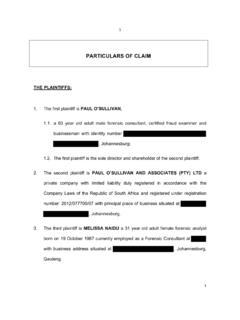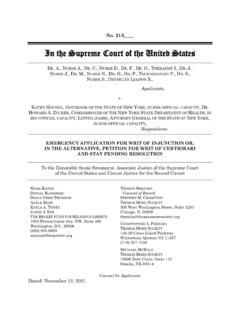Transcription of 42 USC Section 1983- Civil Action for Deprivation of Rights
1 1. 42 USC Section 1983 - Civil Action for Deprivation of Rights The Civil Action for Deprivation of Rights Act is commonly known as Section 1983 . The purpose of the Act is to provide a private remedy for violations of Federal Law. Section 1983 states: "Every person who under color of any statute, ordinance, regulation custom or usage of any State or Territory or the District of Columbia, subjects, or causes to be subjected, any citizen of the United States or other person within the jurisdiction thereof to the Deprivation of any Rights , privileges or immunities secured by the Constitution and laws, shall be liable to the party injured in an Action at law, suit in equity, or other proper proceeding for redress, except that in any Action brought against a judicial officer for an act or omission taken in such officer's judicial capacity.
2 Injunctive relief shall not be granted unless a declaratory decree was violated or declaratory relief was unavailable. For the purposes of this Section , any Act of Congress applicable exclusively to the District of Columbia shall be considered to be a statute of the District of Columbia.". The most common use for Section 1983 has been to get relief for those deprived of their Rights by police officers and other law enforcement officials. But in 1961, The Supreme Court of the United States articulated three purposes that bolster the statute in Monroe v. Pape,1 where Mr. Monroe was allowed to sue Chicago police officers who allegedly committed gross violations of his constitutional Rights .
3 Due to this decision, Section 1983 can be used: "1. To override certain kinds of state laws. 2. To provide a remedy where state law was inadequate and 1. Monroe v. Pape, 365 167(1961). 2. 3. To provide a Federal remedy where the state remedy, though adequate in theory, was not available in practice.". 4. To permit private litigants a Federal court remedy as a first resort rather than having to first bring suit in state court.". Simply put, a litigant does not have to begin in state court. However, if the plaintiff chooses to sue under Section 1983 in state court, the defendant also has the right to remove the case to Federal Court. The Supreme Court has further interpreted Section 1983 to allow liability to be found where government officials act outside the scope of the authority granted to them by state law.
4 Section 1983 clearly provides: 1. Only persons under the statute are subject to liability, not the state. State Officers can be sued in their official capacity for injunctive relief. Note: A suit against a government official acting in his or her official capacity represents nothing more than a suit against the Federal, state or local government entity itself. Individual employees of any Federal, state or local government may be sued for 2. The Defendant (local, state or Federal government official) must have exercised power given to her or him by virtue of state law and made possible only because the defendant is "clothed with the authority of state law" even if the defendant abuses his or her position.
5 This is the definition of "acting under the color of state law.". 2. Forsythe, Ian D. "A Guide To Civil Rights Liability Under 42 1983 : An Overview of Supreme Court and Eleventh Circuit Precedent," , as found on 3. 3. There must be"causal connection" between the defendants's actions and the harm that results. There is no "state of mind" or "intent". requirement. The only requirement is that the Action taken by the government causes harm and is a result of an executed policy statement, ordinance, regulation or decision officially adopted and authorized by that body's officers or the result of that entity's customs. Section 1983 is not, in and of itself, a source of substantive Rights .
6 It provides a method for the vindication of Rights already conferred in the United States Constitution and Federal Laws. A person bringing an Action under Section 1983 may prevail only if he or she can demonstrate (show) that he or she was "deprived" of Rights secured by the United States Constitution or federal statutes. The origins of Section 1983 can be traced back to the post Civil War South, when African Americans suffered abuses at the hands of state and local officials who chose not to follow United States Constitutional law, but instead followed local customs to keep systems of discrimination and segregation in place. Types of Section 1983 Claims (Note: The claims shown below are a few examples of the claims possible under Section 1983 .)
7 Section 1983 claims are not limited to just those shown below.). Many persons believe that the only cases that can proceed under Section 1983 are cases involving law enforcement officials in the case of the use of excessive force. Typically these are the most common claims. Other law enforcement claims include false arrest and claims of unreasonable searches of an individual's home, vehicle or physical person. Other Section 1983 cases and claims can include: 4. 1. Death Cases: Issues of Wrongful death- These include fatal police shootings. These cases usually give rise to state law wrongful death actions as well as Section 1983 . excessive force claims.
8 The advantages to filing under Section 1983 is the ability to seek both punitive damages as well as "abstract" damages for the value of the life lost. Punitive damages and abstract damages are usually not available under the Wrongful Death In the case of Jones v. Hildebrant (Colorado 1976) the mother of a fifteen year-old black youth who was shot and killed by an on duty Denver, Colorado police officer, brought suit under the wrongful death statute of the State of Colorado and for the intentional Deprivation of her son's Civil Rights without due process of law, under Section 1983 , both in Colorado state Mrs. Jones sought $1,500, in compensatory damages and $250, in punitive damages.
9 The trial court ruled that the state wrongful death statute did not permit punitive damages. The trial court further ruled that her Section 1983 claim "merged" with the claims under the Colorado wrongful death statute and dismissed the Section 1983 claim as a separate cause of Action . This limited Mrs. Jones' recovery to a "net pecuniary loss" maximum of $45, under Colorado state law. The wrongful death claim went to a jury trial in state court where she was awarded $ Mrs. Jones appealed and the Colorado Supreme Court ruled that if the Action had been brought in federal court, the Colorado wrongful death statute would have been "incorporated"(or made available in) into the Section 1983 Action , making punitive damages for wrongful death a possibility under Federal law, where the Federal Tort remedy may have applied.
10 2. First Amendment Claims: Section 1983 can be employed in matters where there is a First Amendment right to free speech concerning government employees. Protection against retaliation by government entities against whistleblowers is the goal in these claims. The speech protected in these cases must concern a matter or matters of public concern or relevance in the community where the matter occurs, and not "purely personal grievances".5 In "Pickering v. Board of Education", Pickering was a 3. Loevy, Jon " Section 1983 Litigation In A Nutshell: Make A Case Out of It!", The Journal of the DuPage County Bar Association, Volume 17(2004-05), 4. Houlihan, Michael " Civil Rights - Section 1983 -Wrongful Death Action -Availability of Damages in Excess of Those Permitted Under State Law- Jones v.


